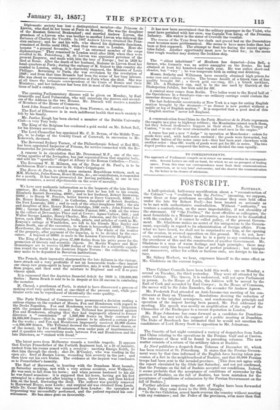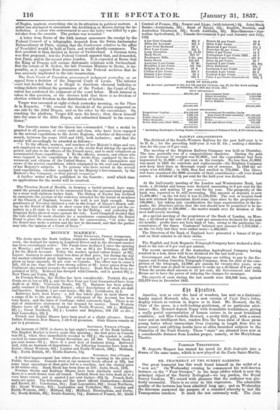POSTSCRIPT.
SATURDAY.
A half-quizzical, half-crazy mystification about a "reconstruction of the Cabinet "—a "coalition with the Peelite4," (meaning, we suppose, some three or four gentlemen so-called because they once held office under the late Sir Robert Peel)—has been treated so seriously as to be met with authoritative contradiction. Without "authority," we venture a contradiction, on the mere improbability, if not absurdity of the statement. Of "the Peelites," the most effective as colleagues, the most formidable to a Minister as adversaries, are known to be dissatisfied with the conduct, if it cannot be called policy, of the present Government. Mr. Gladstone makes no secret of his antagonism to the Government, especially in regard to its administration of foreign affairs. From what we have heard, we shall not be surprised to see him, at the opening of the session, in avowed opposition on this ground. We do not, however, understand, or believe, that he is a party to any combination for the overthrow of this and the construction of another Government. Mr. Gladstone is a man of warm feelings and high principle ; these may sometimes carry him beyond the line of perfect prudence; but intrigue and manoeuvre, either for selfish or factious ends, are foreign to his nature.
Mr. Sidney Herbert, we hear, expresses himself to the same effect as Mr. Gladstone on the current topics.
Three Cabinet Councils have been held this week ; one on Monday, a second on Tuesday, the third yesterday. They were all attended by the entire Cabinet. The Queen, it is understood, will not open Parliament in person. In the House of Lords, the Address will be moved by the Earl of Cork and seconded by Earl Cowper; in the House of Commons, the mover will be Sir John Ramsden, the seconder Sir Andrew Agnew.
Mr. Frederick Peel attended an Anti-Income-tax meeting of his constituents at Bury on Thursday. Resolutions desiring the reduction of the tax to the original sevenpence, and condemning the principle and operation of the impost having been passed, Mr. Peel addressed the meeting. His speech was merely an amplification of the reply of the Chancellor of the Exchequer to a recent deputation in London.
Mr. Hope Johnstone has come forward as a candidate for Dumfriesshire, and has met with the support of a public meeting at Dumfries. The Duke of Buccleueh has intimated that he would not sanction the candidature of Lord Henry Scott in opposition to Mr. Johnstone.
The Gazette of last night contained a variety of despatches from India and China relating to the operations in the Persian Gulf and at Canton. The substance of these will be found in preceding columns. The new matter consists of a return of the artillery taken at Bushire.
Le Nord publishes a despatch from Teheran of December 21, which has been received at St. Petersburg. It states that the I'ersian Government were by that time informed of the English force having taken possession of a fort in the neighbourhood of Bushire, and that 60,000 Persian troops had been sent to the invaded province. [This does not agree with the report circulated by the Globe last Saturday, and not yet confirmed, that the Persians on the fall of Bushire accepted our conditions. Indeed, it seems probable that the acceptance of conditions of surrender by the garrison of Bushire, on the fall of Reshire, has been mistaken for the acceptance of conditions of submission by the Persian Government on the fall of Bushire..]
Further advises respecting the state of Naples have been forwarded from Paris : they come down to the 29th January. "In the two Calabrias, armed bands overrun the country without meeting with any resistance; and the Police of the provinces, even more than that
of Naples, neglects everything else in its attention to political matters. A priest has attempted to assassinate his Archbishop at Meters during the benediction. A Canon who endeavoured to save the latter was killed by a pistol-shot from the assassin. The prelate was wounded."
A letter from Berne of the 24th instant announces the receipt by the Federal Council of a telegraphic despatch from the Swiss Ambassador Extraordinary at Paris, stating that the Conference relative to the affair of Neuchatel would be held at Paris, and would shortly commence. The first question is thus decided in favour of Switzerland. A German town was first proposed; but the Federal Council opposed that, and demanded, first Paris, and in the second place London. It is expected at Berne that the King of Prussia will resume diplomatic relations with Switzerland. But the return of M. Sydow, the late Prussian Minister to Berne, is impossible, as it appears from documents in the Federal archives that he was seriously implicated in the late insurrection.
The Paris Court of Cessation pronounced judgment yesterday on an appeal from a decision of the Imperial Court of Lyons. The inferior ' court had decided that it is illegal to distribute electoral bulletins or voting-tickets without the permission of the Prefect : the Court of Cessation has confirmed the judgment of the court below. Much interest is taken in this question as the electors hold that there is no freedom of election without freedom in the distribution of tickets.
Verger was executed at eight o'clock yesterday morning, on the Place de la R. oquette. "He crossed the threshold of the prison supported on one side by the Abbe Hugon, and on the other by the executioner. On reaching the platform, Verger fell upon his knees • then threw himself into the arms of the Abbe Hugon, and submitted knees; to the executioner," The Gazette states that the Queen has commanded "that a medal be granted to all persons, of every rank and class, who have been engaged in the several expeditions to the Arctic Regions, whether of discovery or search, between the years 1818 and 1855, both inclusive; and that the medal will aecordimgIy be awarded as follows— "I. To the officers, seamen, and marines of her Majesty's ships and vessels employed on the several voyages to the Arctic Seas during the specified period, and also to the officers of the French navy, and to such volunteers as accompanied those expeditions. 2. To the officers, seamen, and others who were engaged in the expeditions to the Arctic Seas, equipped by the Government and citizens of the United States. 3. To the commanders and crews of the several expeditions which originated in the zeal and humanity of her Majesty's subjects. 4. To persons who have served in the several land expeditions, whether equipped by her Majesty's Government, by the Hudson s Bay Company, or from private resources."
A further notice will be published in the Gazette ; until which time no applications for the medal will be received.
The Tiverton Board of Health, in forming a burial-ground, have separated the ground intended to be consecrated from the unconsecrated ground, by a stone wall eighteen inches high. The Bishop of Exeter has declined to consecrate the portion of the cemetery intended for the burial of members of the Church of England, because the wall is not high enough. Some gentlemen of Tiverton obtained a rule in the Court of Queen's Bench calling on the Board of Health to show cause why they should not put the cemetery in a fit state to be consecrated by the Bishop; and yesterday Mr. Sergeant Byles showed cause against the rule. Lord Campbell decided that the rule should be made absolute for a mandamus commanding the Burial Board to place the cemetery in a fit state for consecration, "in order that the Board may make a return and the law be discussed, and that the parties may take the opinion of a Court of Error."














































 Previous page
Previous page